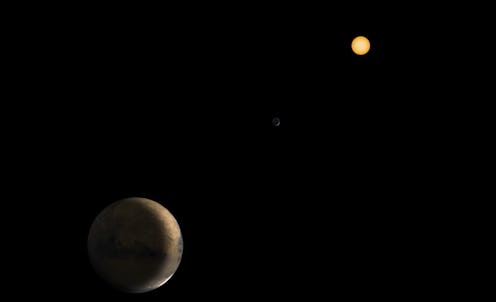
May has definitely been a busy month for that little planet we call Mercury. Not only is the celestial body retrograde until May 22, it's also making its transit between Earth and the sun. The 2016 transit of Mercury began around 7:12 a.m. EST on May 9, and lasts for a little more than seven hours, but if you don't catch it today, you have a while to wait before this happens again. When is the next transit of Mercury? According to scientists, not until Nov. 11, 2019. Astronomy is nothing if not a test of patience.
Although a Mercury transit isn't the rarest of cosmic occurrences, it's also not something to look forward to every year. During the transit of Mercury, people equipped with the proper telescopes and protective eyewear can actually watch as the planet inches its away across the face of the sun as its orbit puts it directly between Earth and the sun. The last time this happened was in 2006, and the next one isn't expected for another three years. NASA calculates that the next one after that will happen in 2032. In total, Mercury transits only happens 13 or 14 times per century, according to Space.com.
The science behind why this happens is a little complicated, but this video by NASA helps to simplify things, as well as give you another handy heads up about other things going down in the universe this month (spoiler: Mercury isn't the only planet to cross paths with Earth):
The 2016 Mercury transit is visible May 9 for people living in United States' East Coast, South America, Western Europe, and Western Africa until around 2:42 p.m. Eastern Time. But, if you do want to check it out, make sure you are using the proper tools. Never, ever, under any circumstances, stare directly at the sun without protective eyewear. And don't forget, us mere Earthlings will need a telescope to watch the action. Some places are actually livestreaming the whole event, so there's no reason to miss out on the occasion if you're interested in watching Mercury do its thing. It's a pretty cool thing to watch. Check out a livestream here.
See that little black speck? That's Mercury, crossing by the sun NBD. Now you can tell your children, and your children's children, and your children's children's children, that you watched the whole thing go down. Of course, by then we'll probably all be casually hanging out in space anyway, so whether or not they'll be impressed remains to be seen.
Images: NASA/YouTube